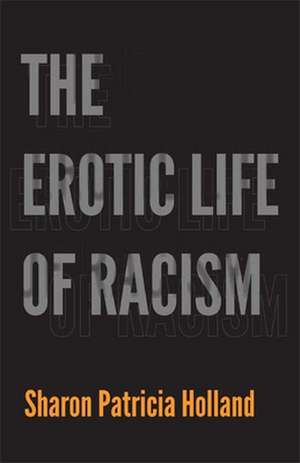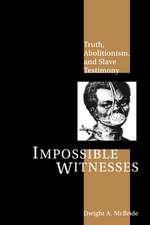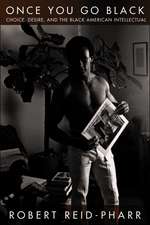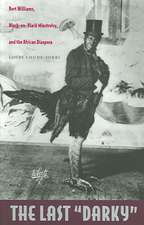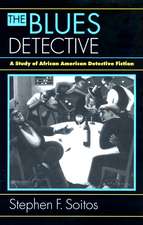The Erotic Life of Racism
Autor Sharon Patricia Hollanden Limba Engleză Paperback – 12 apr 2012
Preț: 186.44 lei
Nou
Puncte Express: 280
Preț estimativ în valută:
35.68€ • 37.34$ • 29.69£
35.68€ • 37.34$ • 29.69£
Carte tipărită la comandă
Livrare economică 31 martie-14 aprilie
Preluare comenzi: 021 569.72.76
Specificații
ISBN-13: 9780822352068
ISBN-10: 0822352060
Pagini: 184
Dimensiuni: 158 x 228 x 12 mm
Greutate: 0.27 kg
Ediția:New.
Editura: Wiley
ISBN-10: 0822352060
Pagini: 184
Dimensiuni: 158 x 228 x 12 mm
Greutate: 0.27 kg
Ediția:New.
Editura: Wiley
Recenzii
"Sharon Patricia Hollands brilliant, provocative study challenges cultural theory by galvanizing a bold new conversation about the too-familiar realities of racism as manifested through everyday erotic attachments, capaciously defined. As the book pointedly tracks the personal, bodily, familial, generational, institutional, and symbolic vectors of desire as implicated in racist ways of being, it brings into refocus a range of concernsbiology, touch, hate and love speech, blood relations, the forbidden, violence, miscegenation, liberal guilt and blamethat powerfully address the persistent pull of racisms ordinariness in a culture that ostensibly desires to move beyond race. This is next-wave feminism, queer studies, and race theory at its best. Marlon B. Ross, author of Manning the Race: Reforming Black Men in the Jim Crow Era
In The Erotic Life of Racism, Sharon Patricia Holland investigates the relation between the erotic and race in cultural theory. The objective of the book is both to counter the prevalent post racial ethos of contemporary American society by showing the continued relevance of the black/white binery, and to investigate various couplings and de-couplings of race and sexuality in the academy. - Ethnic and Racial Studies, Volume 36, Issue 2, 2013
"Sharon Patricia Holland's brilliant, provocative study challenges cultural theory by galvanizing a bold new conversation about the too-familiar realities of racism as manifested through everyday 'erotic' attachments, capaciously defined. As the book pointedly tracks the personal, bodily, familial, generational, institutional, and symbolic vectors of desire as implicated in racist ways of being, it brings into refocus a range of concerns - biology, touch, hate and love speech, blood relations, the forbidden, violence, miscegenation, liberal guilt and blame - that powerfully address the persistent pull of racism's ordinariness in a culture that ostensibly desires to move beyond race. This is next-wave feminism, queer studies, and race theory at its best." Marlon B. Ross, author of Manning the Race: Reforming Black Men in the Jim Crow Era "In The Erotic Life of Racism, Sharon Patricia Holland investigates the relation between the erotic and race in cultural theory. The objective of the book is both to counter the prevalent 'post racial' ethos of contemporary American society by showing the continued relevance of the black/white binery, and to investigate various couplings and de-couplings of race and sexuality in the academy." - Ethnic and Racial Studies, Volume 36, Issue 2, 2013
In The Erotic Life of Racism, Sharon Patricia Holland investigates the relation between the erotic and race in cultural theory. The objective of the book is both to counter the prevalent post racial ethos of contemporary American society by showing the continued relevance of the black/white binery, and to investigate various couplings and de-couplings of race and sexuality in the academy. - Ethnic and Racial Studies, Volume 36, Issue 2, 2013
"Sharon Patricia Holland's brilliant, provocative study challenges cultural theory by galvanizing a bold new conversation about the too-familiar realities of racism as manifested through everyday 'erotic' attachments, capaciously defined. As the book pointedly tracks the personal, bodily, familial, generational, institutional, and symbolic vectors of desire as implicated in racist ways of being, it brings into refocus a range of concerns - biology, touch, hate and love speech, blood relations, the forbidden, violence, miscegenation, liberal guilt and blame - that powerfully address the persistent pull of racism's ordinariness in a culture that ostensibly desires to move beyond race. This is next-wave feminism, queer studies, and race theory at its best." Marlon B. Ross, author of Manning the Race: Reforming Black Men in the Jim Crow Era "In The Erotic Life of Racism, Sharon Patricia Holland investigates the relation between the erotic and race in cultural theory. The objective of the book is both to counter the prevalent 'post racial' ethos of contemporary American society by showing the continued relevance of the black/white binery, and to investigate various couplings and de-couplings of race and sexuality in the academy." - Ethnic and Racial Studies, Volume 36, Issue 2, 2013
Cuprins
Acknowledgments ix
Introduction: The Last Word on Racism 1
1. Race: There's No Place like "Beyond" 17
2. Desire, or "A Bit of the Other" 41
3. S.H.E.: Reproducing Discretion as the Better Part of (Queer) Valor 65
Conclusion: Racism's Last Word 95
Notes 115
Bibliography 147
Index 161
Introduction: The Last Word on Racism 1
1. Race: There's No Place like "Beyond" 17
2. Desire, or "A Bit of the Other" 41
3. S.H.E.: Reproducing Discretion as the Better Part of (Queer) Valor 65
Conclusion: Racism's Last Word 95
Notes 115
Bibliography 147
Index 161
Descriere
In this major work of Black queer feminist theory, Sharon Holland examines the intertwined histories of critical race theory, queer theory, and Black feminism, histories which could not have been formed in the same way without each other, but which now are often held at a respectful distance. As a result of that distance, each sees the other as more uniform than it is, which leads Holland to investigate what parts of queer theory or Black feminism or critical race theory are borrowed or criticized by the others and why. She is critical of ways that some queer scholars have moved away from feminism around issues of reproduction and of how the ordinary and quotidian pervasiveness of racism is constantly overlooked. She argues that a full account of the erotic would need to connect racism and desire, not hold them apart.
